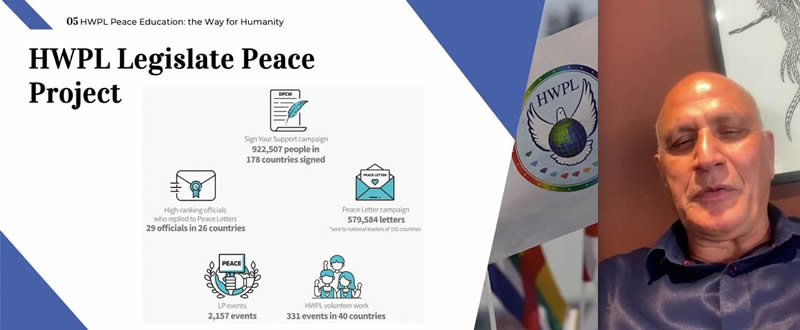Heavenly Culture, World Peace, Restoration of Light (HWPL) July 20 this year hosted a human rights webinar titled “Promoting Peace Education in the MENA Region to Achieve Sustainable Development ” The webinar brought together key speakers in education from eight Middle Eastern countries Egypt, Qatar, Iraq, Jordan, Lebanon, Bahrain, UAE, and Saudi Arabia to discuss the importance of peace education and explore cooperative strategies for sustainable development in the Middle East and Africa.
HWPL peace education is values education to pass on peace as a legacy to future generations. The vision of HWPL peace education is to make students properly recognize the value of peace, cultivate its spirit, and spread a culture of peace.
HWPL plans to conduct a series of ongoing human rights webinars to facilitate the exchange of ideas and strategies for defending human rights in Middle Eastern and African nations. By addressing specific issues such as the civil wars in Syria and Yemen, and the ongoing Israeli-Palestinian conflict, HWPL aims to foster a deeper understanding and cooperative efforts among participants.
The webinar was a stage for NGOs and human rights organizations to build mechanisms and enhance their unity in discussing peace. The occasion brought attention to the importance of eradicating all forms of violence worldwide and fostering inclusive, peaceful cultures and institutions for long-term growth. Specially, It sought for promoting a culture of peace and tolerance among the youth, who are often the most affected by the regional instability and violence.

One of the keynote presenters, Dr. Ibrahim Ahmed, an international law professor at the American University in Cairo, said, ” Article 10 of the DPCW(Declaration of Peace and Cessation of War) says a sustainable world of peace. The most significant take away from today’s webinar is that every nation’s sustainable development depends on a peaceful environment. Beyond just the absence of war or conflict, peace also refers to a situation in which all parties respect one another, work together, and develop as a community. To create such a peaceful atmosphere, national efforts are needed, and I think HWPL’s peace education initiatives may support these efforts.”
There are 38 clauses and 10 articles in HWPL’s Declaration of Peace and Cessation of War (DPCW). The statement outlines the roles that individuals, societies, and nations must play in bringing an end to war. It also discusses the principles and strategies for preventing and resolving conflicts as well as the creation of a peaceful worldwide society.
“Many people want peace, but many requires to achieve peace, and it seems that we have no choice but to work hard for it,” stated Dr. Jasim Husain Ali Ghuloom, Bahrain Former Member, Parliament added “Peace also benefits from vocational training for economic development. I appreciate you extending this invitation to me”.
In November 2020, HWPL conducted a human rights webinar focusing on human rights violations against minority groups in Iraq and Lebanon. Subsequent webinars addressed human rights abuses against minority religious groups in Egypt, human rights violations in conflict zones during the pandemic, and alliances for human rights protection.
Most recently, in May 2024, HWPL organized a comprehensive forum to explore sustainable development through peace education in Africa. By integrating and expanding its peace education programs in MENA region schools and universities, HWPL seeks to promote a culture of peace and tolerance among the youth, contributing to long-term stability and reconciliation in the region.





